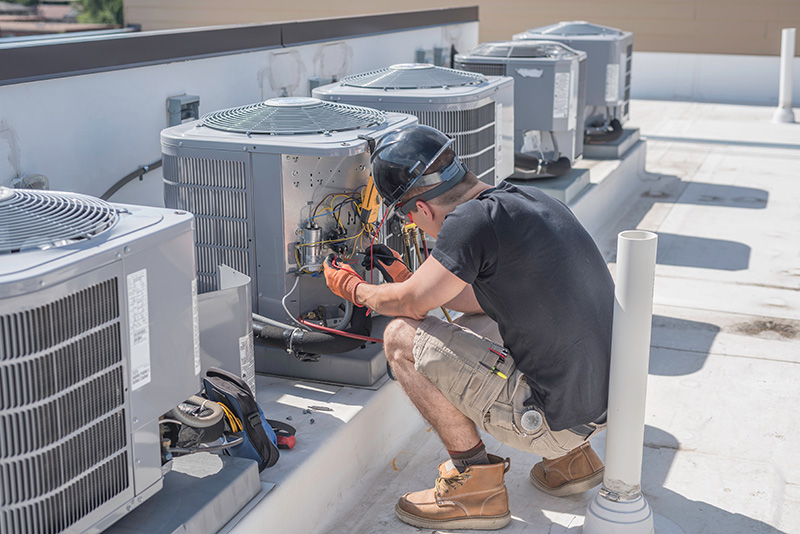Customizable System Upgrades with DMAKS HVAC Tailored Solutions.
Wiki Article
Energy-Efficient Cooling And Heating Equipments to Reduce Utility Costs
As power costs proceed to climb, the significance of energy-efficient a/c systems becomes significantly apparent. These systems not only promise significant cost savings on energy costs but additionally add to a much more lasting future by decreasing energy usage. With various alternatives available, including geothermal heat pumps and ductless mini-splits, home owners encounter a plethora of selections that can boost comfort and air top quality. Understanding the crucial attributes and maintenance requirements is essential to maximizing these advantages. What variables should be prioritized when selecting the best system for your requirements?Advantages of Energy-Efficient Cooling And Heating Equipments
Energy-efficient heating and cooling systems supply various benefits that extend past plain cost financial savings. One significant benefit is the minimized environmental effect. By eating much less energy, these systems add to reduce greenhouse gas discharges, aiding to fight environment adjustment and advertise sustainability. This straightens with increasing societal demands for environmentally friendly methods in household and commercial settings.Additionally, energy-efficient heating and cooling systems usually provide enhanced comfort levels. Most of these systems feature advanced technology that permits better temperature control and improved air quality (DMAKS HVAC). This results in a healthier indoor environment, which is particularly important for individuals with allergic reactions or respiratory system concerns
In addition, purchasing energy-efficient cooling and heating systems can boost property worth. As even more consumers prioritize power performance, homes and structures furnished with these systems may attract greater quotes in the realty market.
Types of Energy-Efficient HVAC Options
How can home owners and organizations choose the most suitable energy-efficient cooling and heating alternatives for their demands? The market offers a selection of energy-efficient a/c systems, each designed to boost comfort while minimizing power consumption.One choice is the variable refrigerant circulation (VRF) system, which effectively controls the temperature in numerous zones within a structure. This system adapts its cooling agent flow to match the desired temperature level, resulting in significant power savings.
An additional popular selection is geothermal heatpump, which utilize the earth's stable temperature level to heat and great spaces. By moving heat to and from the ground, these systems show impressive performance, particularly in modest climates.
Additionally, ductless mini-split systems supply an energy-efficient alternative for homes doing not have ductwork. These systems permit zone-specific cooling and heating, reducing energy waste in empty areas.
Finally, high-efficiency heaters and air conditioning unit, with sophisticated SEER and AFUE rankings, provide trustworthy climate control while consuming less power than typical models. By examining these alternatives, homeowners and services can pick a HVAC system tailored to their certain demands and power efficiency goals.
Secret Attributes to Take Into Consideration

Next, explore the sort of compressor made use of in the system. DMAKS HVAC. Variable-speed compressors can change their result to match the heating or cooling down demand, causing improved convenience and power cost savings contrasted to single-speed models. In addition, search for systems outfitted with smart thermostats that supply programmable settings and remote gain access to, allowing for much better control over power consumption
Another important function is the system's air filtering ability. High-efficiency filters can boost interior air high quality and minimize power intake by ensuring the system operates efficiently. Furthermore, consider the type of cooling agent made use of; modern-day systems usually use eco-friendly cooling agents that have a reduced ecological effect.
Lastly, ensure that the system is suitable with zoning technology, which permits personalized temperature control in various areas of your home, enhancing convenience while lessening energy use.
Tips for Selecting the Right System


Next, consider power performance scores, especially the Seasonal Energy Performance Proportion (SEER) for cooling systems and the Annual Gas Use Effectiveness (AFUE) for heating systems. Greater scores indicate greater performance, which can cause significant savings on energy bills over time.
In addition, assess the kind of cooling and heating system that finest suits your way of living and budget plan. Options consist of air conditioning, ductless mini-splits, and warmth pumps, each with its own collection of advantages and drawbacks.
Do not overlook the relevance of appropriate installment and sizing; an improperly sized system can lead to inadequacies and increased wear. Last but not least, seek advice from a specialist heating and cooling contractor to acquire skilled recommendations customized to your home's unique demands. This thorough method web will certainly ensure that you choose an energy-efficient cooling and heating system that meets your requirements and spending plan efficiently.
Upkeep for Optimum Efficiency
When the ideal HVAC system is in location, recurring upkeep becomes essential to making sure optimum performance and longevity. A well-kept system operates a lot more properly, resulting in lower energy usage and minimized energy expenses. Normal examinations and tune-ups should be scheduled a minimum of twice a year-- once before the cooling season and once before the heating season.
Home owners must also be attentive about checking their heating and cooling system's efficiency. Unusual sounds, rising and fall temperature levels, or enhanced power bills can show underlying issues that require immediate interest. By dealing with these problems without delay, property owners can protect against expensive fixings and extend the life expectancy of their systems.
Spending in a maintenance plan with a certified technician not only improves performance but likewise gives assurance, recognizing that the system is operating at its best. DMAKS HVAC. Routine upkeep is therefore vital for maintaining power performance and reducing general operational expenses
Verdict
To conclude, energy-efficient heating and cooling systems provide a feasible remedy for reducing utility bills while enhancing comfort and air high quality. By integrating sophisticated modern technologies and alternatives such as geothermal heatpump and ductless mini-splits, homeowner can achieve considerable energy savings and add to environmental sustainability. Careful consideration of system features and ongoing upkeep better ensures optimum efficiency, making energy-efficient systems a sensible financial investment for both economic and environmental benefits.Report this wiki page